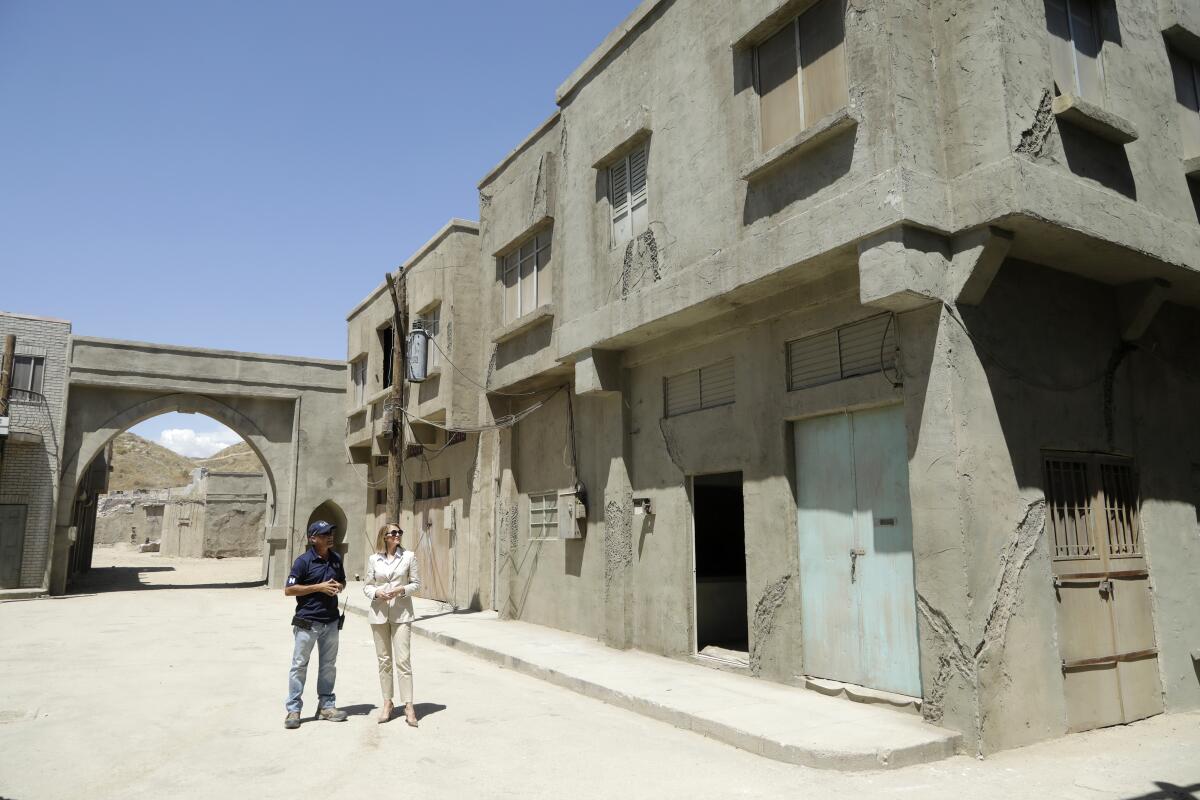Meet the former diplomat and soap opera producer who wants to be California’s chief film ambassador

On a sweltering July afternoon, Colleen Bell strolled through an alley that had been transformed into a grimy, urban skid row for the CBS police drama “S.W.A.T.”
The rusty garage doors, dusty lamps and worn building facades resembled downtown L.A. But Bell was about 40 miles away from the alley’s inspiration, on the Santa Clarita set of “S.W.A.T.,” which was prepping its third season.
“Look at that — amazing,” said Bell, marveling at the alley’s transformation. “Wow.”
As a veteran TV producer, Bell could appreciate such detail. The former U.S. diplomat, who was appointed executive director of the California Film Commission in May, was making the rounds to visit various local productions that have benefited from state tax credits.
In her new role, the 52-year-old executive will draw upon her background as a diplomat and industry veteran to champion California’s film industry while maintaining relationships with state politicians, whose support is vital.
“I’m very comfortable in Sacramento and very comfortable in Hollywood,” Bell said. “I look forward to bridging those two worlds as much as I possibly can.”
One of Bell’s top goals is to increase the amount of money allocated each year to the state’s film and TV tax credit program.
“I want to reinstate California’s position as the leading location for production in the world,” Bell said.
The competition for production is intense, with rivals such as Georgia putting no caps on tax incentives for productions. But California has remained competitive, partly because of changes in the state’s film and TV tax credit program in 2014 and the growth in streaming platforms that are setting up studios in the state.
In an effort to stop so-called runaway production, Gov. Jerry Brown in 2014 approved legislation that tripled the annual allocation of the state’s film and TV tax credit program to $330 million. The program was recently expanded for five more years, ending in 2025.
On her recent tour in Santa Clarita, Bell visited several sets to see how the state’s incentives have helped film and TV productions and boosted jobs.
“S.W.A.T.” received $15.5 million in tax credits for its pilot and first season, and has been allocated an additional $34.8 million for its Seasons 2 and 3.
If the tax credits weren’t available, “our show wouldn’t have been here,” James Scura, a producer and production manager, told Bell.
Scura took Bell around a mock neighborhood, touting the value of the location almost like a proud real estate agent.
“Everything you see can be set up,” Scura said. “This can be 1893 France. We’re using it for downtown right now.”
“I’ve never seen someone so enthusiastic about an alleyway,” Bell said.
Bell began her TV career in 1991 as a production assistant on “The Bold and the Beautiful,” a CBS soap opera about the love lives of people in the L.A. fashion industry. She worked her way up, becoming a producer on the show, and has been nominated for an Emmy three times.
Bell moved to California in 1991 to marry her childhood sweetheart, Bradley Bell, who is the executive producer and head writer on “The Bold and the Beautiful.” After giving birth to her fourth child and going on an extended maternity leave, Bell decided to dive into policy work on how toxic chemicals are regulated in the U.S. Through her work at the Natural Resources Defense Council, she met Barack Obama, then a U.S. senator. When Obama ran for president, Bell volunteered for his campaign.
In 2013, Obama appointed Bell to serve as U.S. ambassador to Hungary. She was confirmed in December 2014 and served until 2017.
“I had an opportunity to work closely with Colleen when we both served as ambassadors under President Obama,” said John Emerson, vice chairman of Capital Group International Inc. and former U.S. ambassador to Germany. “She was a strong leader, whip-smart collaborator and consensus builder who effectively used her diplomatic skills to advance U.S. interests and policies.”
Bell is also a major fundraiser for Democratic candidates and has donated to campaigns including the presidential run of former Vice President Joe Biden, according to the Federal Election Commission.
In May, Bell was appointed by Gov. Gavin Newsom to become the film commission’s director, replacing Amy Lemisch, who was first tapped by Gov. Arnold Schwarzenegger and spent 15 years in the role. She was instrumental in pushing the state to increase the incentives offered to TV and film productions.
Bell said one of her top priorities is to increase the annual cap on the film and TV tax credit program’s annual allocation — she declined to say by how much — and extend it beyond 2025 to demonstrate the state’s long-term commitment to the industry.
“We have to maintain our competitiveness,” Bell said. “That’s extremely important because I believe you get the best value when you choose California for production, but at the same time, at this point, we’re not able to compete against some of the higher tax incentives that are offered in states like Georgia.”
In 2017, Georgia hosted the highest number of top-grossing domestic movies compared with other states. In Georgia, movies can receive tax credits of up to 30% and apply those credits to actors’ salaries, something that California doesn’t offer (California’s maximum tax credit is 25%).
But some studios are evaluating whether they will keep their productions in Georgia after its governor signed a law that could go into effect next year that would ban abortions for women once fetal cardiac activity is detected. Any second thoughts could benefit California.
“California is a place that doesn’t have any of these restrictive laws pending,” Bell said. “We are a state [where] our people who will be working on these films will feel their rights are being respected.”
Bell also emphasized that she wants everyone to benefit from the economic impact of increased TV and film production across the state. The current law provides an additional 5% tax credit for productions that film outside the 30-mile zone around Los Angeles.
“There are many opportunities,” Bell said. “I don’t want to leave any particular community out of this at this point.”
More to Read
Inside the business of entertainment
The Wide Shot brings you news, analysis and insights on everything from streaming wars to production — and what it all means for the future.
You may occasionally receive promotional content from the Los Angeles Times.











